Graham Reid | | 9 min read
The Kava Diary
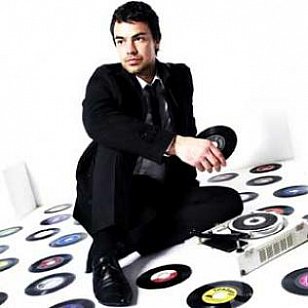
Lance Ferguson is among New Zealand's most successful, hardest working but perhaps the least known of our musical exports.
The grandson of Tongan-born, New Zealand lap steel legend Bill Wolfgramm (who enjoyed a friendly rivalry with the more successful Bill Sevesi from the Forties onward, and who died in 2003), Lance Ferguson left New Zealand 20 years ago.
In Melbourne he founded the enormously successful soul-funk band The Bamboos (multiple nominees for Apra and Aria Awards, seven studio albums), also helms a studio side-project Lanu, does numerous production jobs for Britain's Brighton-based Tru Thoughts label and . . .
“Well, I've got to keep the wolf from the door,” he laughs. “I'm making music and records and sometimes there's a lot of stuff to do. But I feel very lucky, so it never feels like it's hard work in the same way as when I washed dishes for a living as a youngster.
“There are a series of other projects too, there's Black Feeling based on classic blues and soul covers, and I also do a radio show here for Double J which is a soul music show.
“I do have a wife and family so there is a balance and I spend as about those guys as I can.”
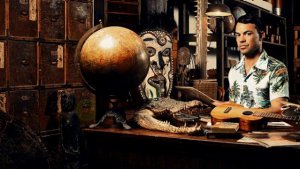 The latest project for the Lanu
offshoot (“the name came from a weird shortening of my name as a
kid, New Zealand-style, but later I found out it is the Tongan word
for colour which is a nice coincidence”) is the album The Double
Sunrise, an exotically conceptual album with his regular singer Megan
Washington and French singer Madeline Pain from Nouvelle Vague.
The latest project for the Lanu
offshoot (“the name came from a weird shortening of my name as a
kid, New Zealand-style, but later I found out it is the Tongan word
for colour which is a nice coincidence”) is the album The Double
Sunrise, an exotically conceptual album with his regular singer Megan
Washington and French singer Madeline Pain from Nouvelle Vague.
It explores something dear to his heart, the golden age of aviation and air travel in the Forties and Fifties which he links with the sound of his grandfather, the exotica music of Martin Denny which he collects and influences from Brian Eno's ambient music.
Wrapped in a cover that is classy but not kitsch, the music also doesn't fall into that trap either. Oddly enough although Lanu has three albums behind it, has only ever performed live once: “It was always just a studio project for me, but Megan who was in Berlin is but she's now back in Sydney so I think I can twist her hand to do some live performances. “I'm not sure what the full line-up would be, it may involve some combination of electronic stuff and live music, but we'll sort something out.”
I want to understand the schism between Lanu and Bamboo. Lanu is more personal for you because the songs come from somewhere else and wouldn't fit the Bamboo agenda?
Yeah, When I write music I try to keep my mind as open as I can to whatever happens and not putting things in a box for which project they may work in. That's when I'm working in the studio with no deadline hanging over my head.
Most of the time I do have a deadline though so I do have to write specific things for specific projects.
In the case of this Lanu album, because it is somewhat of concept album, I did think of it as a body of work unto itself.
The Bamboos is a band and there is a certain amount of collaboration in the writing process but most of the time I take the lead in that band.
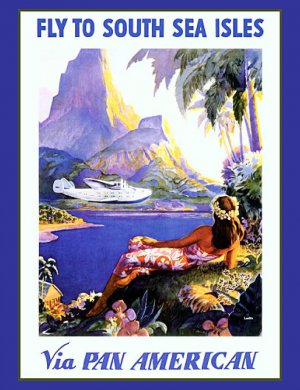 Let's talk about The Double Sunrise
because I'm a bit of a fan of exotica, but not the kitsch end of it.
For me this album isn't kitsch in any way but seems very heartfelt.
I've read what you've said about it, that paean to the days of big
flying boats, Pan Am Clippers and Qantas when air travel seemed very
glamorous. I have to tell you I have huge poster of a Pan Am flying
boat landing in Hawaii with an exotic Hawaiian girl in the
foreground. Was that the kind of romantic notion which prompted it?
Let's talk about The Double Sunrise
because I'm a bit of a fan of exotica, but not the kitsch end of it.
For me this album isn't kitsch in any way but seems very heartfelt.
I've read what you've said about it, that paean to the days of big
flying boats, Pan Am Clippers and Qantas when air travel seemed very
glamorous. I have to tell you I have huge poster of a Pan Am flying
boat landing in Hawaii with an exotic Hawaiian girl in the
foreground. Was that the kind of romantic notion which prompted it?
I've had a lifelong obsession with aviation and when I was a kid living in Auckland my parents broke up and I'd see my Dad on weekends – he sadly passed away about 16 years ago – but one of my big heartfelt childhood memories was going to Motat with Dad.
Back in those days all the planes were just out on the field and fairly dilapidated, but I had a beautiful time hanging out with my Dad and looking at those, especially the Short Solent 4 which is the only one of its kind left in the world. And the Sunderland flying boat and the Lancaster.
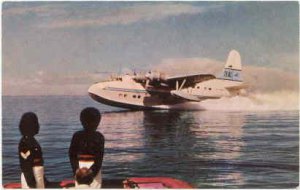 I've held on to this obsession with
aviation and after a while I realised it was due to the connection
with my father, and it was a happy place for me in a childhood which
had some amount of turmoil in it.
I've held on to this obsession with
aviation and after a while I realised it was due to the connection
with my father, and it was a happy place for me in a childhood which
had some amount of turmoil in it.
The combination of that and a love of the elegance of the machines – which are far more interesting and exciting than the shiny airlines of today which are very comfortable, less noisy and much quieter . . . but there's something out that golden age of aviation which really fascinates me.
Usually I am writing love songs or about this and that, but I wanted to write songs that were inspired by that golden age.
There's the song Aranui dedicated to that aircraft and I was imagining a soundtrack to it on a coral reef and all those images of it landing at Aitutaki, the magic of all that.
There's another song which is where the album title comes from, The Secret Order of the Double Sunrise.
There was an air route Qantas flew out of Australia up through Karachi and onward which went for 24 hours and the people on board would see two sunrises. So they would get this certificate and they were part of this secret order of people who had seen two sunrises on a flight. I thought was a magical story and worthy of creating some imagined soundtrack to.
Again, I love exotica and while I like Martin Denny and so on, sometimes the genre errs towards the cliché and you deftly avoid that, the pieces which stand out for me are the gentle ones like Fly Away, Aranui and The Kava Diary, which I think is a lovely piece of music.
Martin Denny recorded those exotica albums 60 years ago of course, and I don't know a lot of people who are mining those sounds these days. So I found that I had to twist it in a certain way to sell it all over again.
I collect a lot of those exotica records and, as you say, they do go straight into the kitsch and tiki-bar thing. That can be fun but I wanted this record to look at the more deep side of this, and I didn't want to cross the line into kitsch even though it tips its hat in that direction.
The Kava Diary is influenced by people like Arthur Lyman and Martin Denny but also one of my favourite Brian Eno pieces called Deep Blue Day which came off the Paris,Texas soundtrack.
I just wanted to weave a bit of that steel guitar into it, it's got that Hawaiian sound but I also wanted a bit of that mood of Eno in there so it didn't sound like a pastiche of things have already been done, but I could to put my own twist on it.
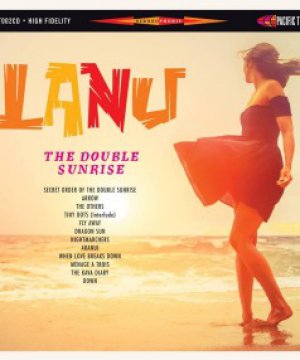 I'm a very big Eno fan, especially
of albums like Apollo and Music for Films, that elegant ambience.
What I like is the album cover because it gently refers to the
exotica but the album sounds contemporary and the cover is too. It's
a very wonderful juggling act between the two.
I'm a very big Eno fan, especially
of albums like Apollo and Music for Films, that elegant ambience.
What I like is the album cover because it gently refers to the
exotica but the album sounds contemporary and the cover is too. It's
a very wonderful juggling act between the two.
Thank you, I think you are someone who has got where it's coming from. There was that Nineties revival of exotica which really whole-heartedly crossed into the bachelor pad/lava lamp territory which I think can be fun if you are hanging out a bar and ordering drinks. I don't mind that aesthetic at all but because I was also trying to include influences from my grandfather I didn't want it to cheapen all that stuff.
A left-field question before I ask you about Bill. In New Zealand we get Pasifika a lot more easily than Australians, even those on the East Coast. Do you find Australians are coming around to hearing Pacific music and feeling that there is a connection which can be part of their cultural experience?
I'd like to think so. But I'm not even sure how this album will be received in Australia. I make these things and when they come out, who knows what will happen.
But culturally Australia is a very different place to New Zealand. When I was growing up I felt my childhood was effectively and positively integrated with Fijians, Niueans, Maori, Samoans and Tongans. If I was going over to a mate's houses they might be boiling up something in the kitchen that seemed strange to me. It was different, but never different in a way that you would weigh up what was more important or a priority. It was just you accepted that in this guy's house it was like that.
It wasn't like that on the rugby field of course ,because you'd get picked up and thrown 20 metres by some big Samoan guy.
But I loved the fact I had a childhood where I was exposed to all these cultures, even though in the Seventies and Eighties it came in quite a raw way.
A lot of friends were deeply religious and the food they ate was so different. When I talk about that in Australia I get the impression some people don't get it.
There's a larger population of Polynesian people in Sydney, and Melbourne where I live. But it's a different thing here. It seems like to me that racism is ignorance and fear, and I know that's an obvious statement.
Of course, there are racial tensions
everywhere and in every country, but I felt that I didn't have that
fear of the unknown with these cultures because I was hanging out in
those peoples homes all the time. Even though it was different, it
was never the unknown and I wasn't ignorant about it.
So I wasn't
scared of it.
I'd like to ask you about Bill Wolfgramm. I read recently you've been collecting his recordings. When you look for and listen to your grandfather's music, what is it that you are hearing in it that is important to you: a lineage, a connection . . .?
I never spent much time with him as a kid. I have a few fleeting memories of sitting next to him but this was a guy who released New Zealand's first LP record and I collect all those things on Zodiac (Records]. He had a prolific output and when I listen I'm trying to get to know who this guy was.
He was a complex man who had a very dysfunctional personal life and I've heard a lot of tales of woe from my family about the things he was capable of, the alcohol-fueled examples of very poor behaviour.
So I've grown up with these stories all my life, but I wanted to know who he was in his prime.
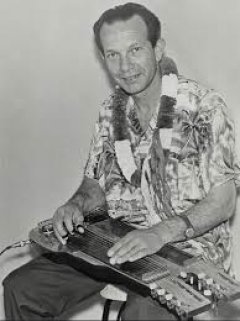 I want to know about him when he was
playing the Orange Ballroom [in Auckland] and selling lots of
records, and in that friendly rivalry with Bill Sevesi.
I want to know about him when he was
playing the Orange Ballroom [in Auckland] and selling lots of
records, and in that friendly rivalry with Bill Sevesi.
I want to get a picture of who he was at that time.
I recently went over to Auckland and interviewed Bill Sevesi (pictured) in his nursing home, he's 93 now, and I feel like part of this album is about investigating and confronting Bill Wolfgramm as a person in my life who I didn't know but whose musical legacy is so strong.
Because of that, the other side of his personality I put to the back because I didn't want to confront it.
But as a father now it's important to me to figure out for myself who he was, and Bill Sevesi had stories to tell I hadn't heard before. I got a different side of the story.
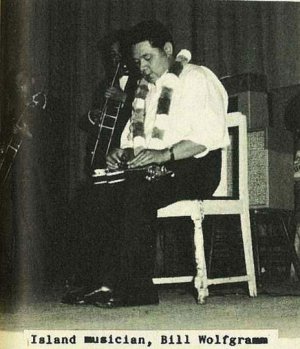 It seems Bill Wolfgramm (pictured) had an absolute
gift, a golden touch on the guitar, and Bill [Sevesi] said he always
felt Bill [Wolfgramm] was a much better guitarist than he was.
It seems Bill Wolfgramm (pictured) had an absolute
gift, a golden touch on the guitar, and Bill [Sevesi] said he always
felt Bill [Wolfgramm] was a much better guitarist than he was.
The problem however was Bill Wolfgramm was so unreliable and wouldn't show up, so Bill Sevesi had the more successful career. It's that old thing about 99 percent of success is showing up, although obviously Bill Sevesi is an amazing player.
But Bill Wolfgramm had – and I hate to use this word after that television programme – but he had an X factor, his playing could be magical. But he was let down by substance abuse and maybe his childhood was messed up, I haven't traced it that far back.
But he is such an interesting character to me and his blood flows through my veins, so I want to know which parts of me come from him.
When I put his records on I feel that warmth come out of his hands. He had a magic touch.
In the end that is probably all that matters. The music endures?
Yes, this is the thing I'm quite conscious of with the records I put out. I know the music will endure. But Bill put out so many records . . .
There's always another one for me to find.

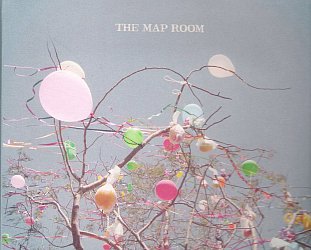
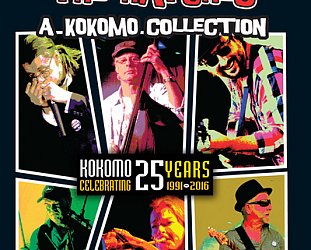
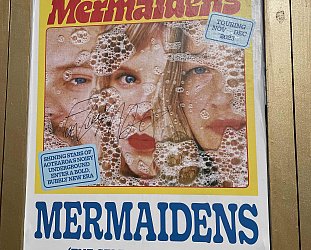
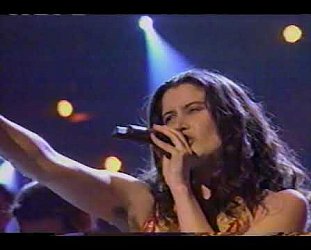
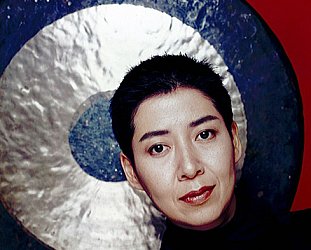

Mick - Feb 9, 2016
Great interview with Lance Ferguson. Got to say he is very well respected here in Australia. Is Lance related to the Melbourne girls, the Wolfgramm Sisters (Talei, Eliza and Kellie) who are fine musos themselves and sing like angels? GRAHAM REPLIES: Odd that he is so little known in his homeland (but Bamboos haven't played here much, if at all). Re. the Wolfgramm sisters: Can't answer that but I'd be surprised if they weren't relatives.
Savepost a comment